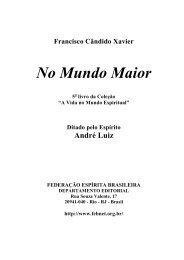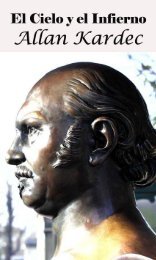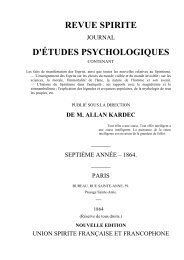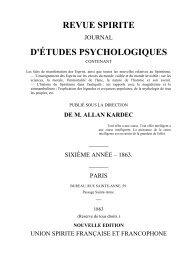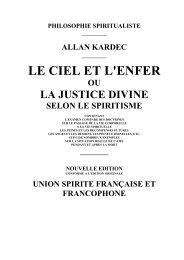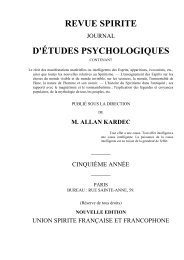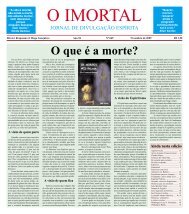PDF version - Geae
PDF version - Geae
PDF version - Geae
Create successful ePaper yourself
Turn your PDF publications into a flip-book with our unique Google optimized e-Paper software.
great new truth on principle in politics or religion at once, because he has been prepared in former lives to<br />
understand it. Another must be convinced by force of arguments, because it is new to him.<br />
Without this explanation of former lives, the diversity without limit in the matter of intelligence and<br />
consciousness would remain an unsolvable problem. Genius is not, we have said, explained by heredity or<br />
conditions of environment. If heredity could explain it, it would be more frequent. The majority of celebrated<br />
men have sprung from mediocre conditions. Christ, Socrates, Joan of Arc, were born of obscure families.<br />
Illustrious scientists and philosophers have risen from the most common antecedents. Bacon, Copernicus,<br />
Galvani, Keppler, Hume, Kant, Locke, Malebranche, Spinoza, Laplace, J. J. Rousseau, can all be named in this<br />
class. No explanation of heredity can give us the key to the genius of Shakespeare. The facts are no less<br />
significant regarding the descendants of men of genius. Their power of intellect departs with them, and it is<br />
rarely found in their children. The sons of a great poet or a great mathematician are often incapable of the<br />
elementary work in those two realms. There is a long list of illustrious men whose sons were stupid or<br />
worthless - Pericles, Aristides, Thucydides, Sophocles, Germanicus, Cicero, Vespasian, Marcus Aurelius, not<br />
to mention the sons of Charlemangne, Henry IV., etc.<br />
There are, however, cases where talent seems hereditary. That is when the psychic resemblance exists<br />
between parents and children, and can be traced back to sympathies existing in former lives. Mozart came<br />
from a musical family, yet its musical capacity was not sufficient to explain how he could have a knowledge of<br />
the laws of harmony at the age of four! He alone of his family became celebrated, the other Mozarts remaining<br />
obscure.<br />
Evidently when the great intelligences can, in order to manifest their faculties more freely, they<br />
reincarnate in an environment where their tastes will be understood and encouraged. That is often the case with<br />
musicians, for whom special conditions of sensation and perception are indispensable. But in most cases<br />
genius appears in the bosom of a family, without precedent or successor in the chain of generations. The great<br />
founders of religion and the great moralists were of these - Lâo-Tsze, Buddha, Zarathustra, Christ,<br />
Mohammed, Plato, Dante, Newton, Giordano Bruno. If the brilliant or sad exception created in a family by the<br />
apparition of a man of genius or a criminal was a simple case of atavism, we would find in the family<br />
genealogy some ancestor who served as a model - a primitive type of the manifestation. But this is rarely the<br />
case in either sense. The question may be asked us how we conciliate these dissimilarities with the law of<br />
attractions of similars, which seem to preside as the coming together of souls. The penetration into certain<br />
families of superior or inferior beings who came to give or receive education, to submit to or exercise a new<br />
influence, is easily explained. It results from the chain of common destinies, which at certain points rejoins and<br />
enlaces again, as a consequence of affection or hate exchanged in the past: forces equally attractive which<br />
reunite souls on successive planes in the vast spiral of evolution.<br />
We have said in an earlier book, In the Invisible, that genius owes much to inspiration, and that<br />
inspiration is a sort of mediumship. But we must add that when this faculty is specially and clearly indicated,<br />
the man of genius cannot be considered a mere instrument, which is all that mediumship proper would make<br />
him. Genius is above all an acquisition of the past, the result of patient studies, of slow and painful initiation;<br />
these have developed in the being a profound sensibility, which opens the door to high influences.<br />
There is a pronounced difference between the intellectual manifestations of child prodigies and<br />
mediumship in its generally accepted sense. One has a character intermittent, abnormal. Mediumship cannot at<br />
all times exercise its faculty, but must have special conditions often difficult to obtain. But infant prodigies are<br />
able to use their talents at any moment, in a permanent manner, as we do who have acquired control of our<br />
mental faculties. If we analyze these cases with care we will recognize the fact that the genius of young<br />
prodigies is personal. Its application is regulated by their will, and their works, astonishing as they appear,<br />
represent always something of their age, and not that of a high foreign influence, as in the case of mediumship<br />
controls.<br />
There is always in their manner of working a hesitation and wavering which would not occur if they<br />
were the passive instruments of an occult, superior will. That is why we say that Pepito, notably, indicates a<br />
long past of preparation. We find certain individuals who combine the two causes, personal acquisition and<br />
exterior inspiration. That does not lessen the theory of reincarnation. We must always have recourse to that to<br />
solve certain problems of inequality; we were not all launched at the same moment in the turmoil of life. We<br />
have not all traveled the same paths, but have come through infinite routes. By this fact are explained our<br />
78



